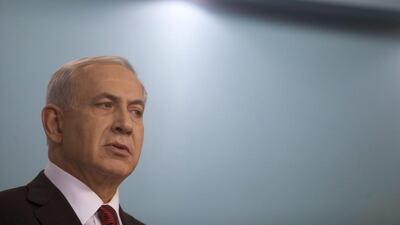Piece by piece, Benjamin Netanyahu is putting together a puzzle. The outlines are only gradually becoming apparent, but, if he completes it, the final picture will not be one that many Israelis, Arabs and Jews, Christians and Muslims will recognise.
The latest law proposed by Israel’s prime minister would exclude non-Jews from “national rights”, while at the same time officially defining Israel as the nation-state of the Jewish people. Unsurprisingly, the bill has been widely condemned, internationally, in the Middle East and even within Mr Netanyahu’s own cabinet. The law, if it passes, would make Israel’s Christians and Muslims second-class citizens, threatening what is already an imperfect democracy and alienating large numbers of Israelis – not merely Christian and Muslim citizens, but secular Jews as well.
But Mr Netanyahu almost certainly has another political goal in mind. Using legal and military means, his government has already made a two-state solution impossible. The proposed “Jewish state” law will destroy the possibility of a one-state solution. Indeed, that is precisely what it is intended to do.
Since its foundation, there has been a tension within the Israeli state between wanting to be a Jewish state and aspiring to be a democracy. If the “Jewish state” bill passes, it will resolve that tension: there would no longer even be the pretence of a democracy in Israel. It would simply be a Jewish state.
Such a move would have profound implications. Making Christian and Muslim citizens of Israel second-class citizens, subordinate to Jewish citizens, would create a religious state – something very different to what exists now.
There are, at the moment, no nation states in the world apart from Israel that provide citizenship solely on the basis of religion. By enshrining the “Jewish nature” of the state in law, the bill would go further: not only would one religious group be privileged in emigrating to Israel, but that same group would be privileged above other citizens of the same state. By doing so, a particular vision of Israel will have triumphed.
There have always been two visions of what Israel could be. The first is a narrow, ethno-nationalist view, a vision of a sanctuary state for one people on a sliver of land in the Middle East. That vision, reaching back to the beginnings of the Zionist movement in the late 19th century, was born in an age of violence and discrimination against Jews in Europe.
In the aftermath of the Second World War and the formation of Israel in 1948, that narrow vision was ameliorated slightly. This was the age of nation states and citizenship and the “Jewish and democratic” character of Israel, enshrined in its founding charter, reflected a changing mood.
It also reflected a reality on the ground. Despite the 1948 war and the migration and expulsion of most of the Palestinian population, there remained a significant number of Palestinian Christians and Muslims in the newly-formed country. It was no longer tenable to enshrine in law the privileging of one faith – although Israel’s critics note that the Law of Return does just that.
But a country based on citizenship and not religion allowed the possibility that Israel could overcome the demons of the past and create a lasting peace with Palestinians and its other neighbours. In time, the two-state solution became the political vehicle for this vision.
These days, the two-state solution looks increasingly unlikely, even impossible. The alternative, one state for both peoples, is now being argued for.
Mr Netanyahu’s law would destroy that possibility. A country that was for Jews only would be a country where Palestinians, Christians and Muslim, Arabs and Druze, would be second-class citizens. It would mean that there could not be a political entity that safeguarded the rights of all religious groups.
That, taken in tandem with the settler movement and its enablers and supporters within Israel, would mean that there would not be a solution at all to the Palestinian question. The possibility of ending the conflict with a two- or a one-state solution would be impossible. And what then?
Israelis should be extremely worried by this law. Because Mr Netanyahu is not merely preparing them for decades of political problems and military confrontation, he is also seeking to appropriate Jewishness itself.
There are myriad traditions of Jewishness around the world: from the rich heritage of Arab Jews such as Moroccans, Iraqis and Yemenis, to those of European communities and, indeed, the more recent traditions of Jewish communities in the US, the UK and elsewhere.
With this law, Israel would seek to decide what “Jewishness” is. And that is a very dangerous thing, given the extreme views of the groups Mr Netanyahu flirts with. Secular Jews in Tel Aviv today could tomorrow find their laws decided using extreme interpretations of Jewish law.
American Jews often jokingly stereotype Israelis as argumentative – it will seem less of a joke when the same Israelis who guard the checkpoints into Palestine today act as the gatekeepers of the religion tomorrow.
falyafai@thenational.ae
On Twitter: @FaisalAlYafai


